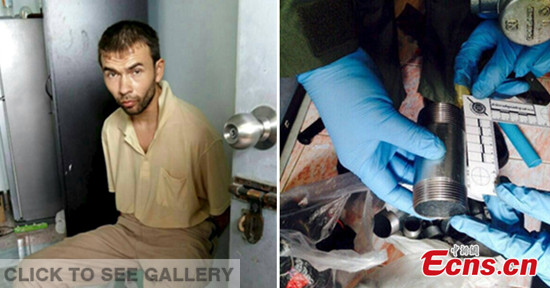Police investigating Thailand's recent bombing raided a second location and widened their search for more suspects on Sunday after a foreigner was arrested and stacks of fake passports and bomb-making materials found at a Bangkok apartment.
According to the Bangkok Post, urea-based fertilizer, flash powder and other items that can be used to construct improvised explosive devices were found in a room in an apartment on Rat-uthit road in Min Buri area.
Bangkok police on Saturday arrested a man with a fake Turkish passport on explosives possession charges in the first possible breakthrough in the deadly bombing two weeks ago.
The blast on August 17 at the Erawan Shrine killed 20 people including seven Chinese nationals and injured 123 others.
Police have not confirmed the identity or nationality of the man. His fake Turkish identity papers stated that he was 28 years old and went by the name Adem Karadag.
Police believe he was also involved in a second, smaller bombing in the Thai capital a day after the attack at the crowded shrine, to which Thais and Asian tourists flock daily.
"Our preliminary investigation shows that he is related to both bombings," Police spokesman Prawut Thavornsiri said.
Stacks of fake passports, a large quantity of bomb-making materials and equipment were found when police raided the man's apartment.
Police said the materials found in the room included 0.5-centimeter ball bearings, the same type used in the attack on the shrine and the attempted bombing at Sathon Pier the following day.
ETIM response
The arrest had fuelled suspicions that the bombing could be an act of retribution after Thailand deported 109 Uyghurs back to China in July.
The deportation had touched off a protest in Turkey.
"The blast could be an act of revenge from the terror group, the East Turkistan Islamic Movement, for the deportation," Wang Guoxiang, an associate professor at the Beijing Academy of Social Sciences, told the Global Times Sunday.
Wang said he believes that terror threat in Thailand will continue due to rising terror activities in Southeast Asian countries, and the fact that Thailand has been a transportation hub for terrorists to travel to the Middle East.
No group has claimed responsibility for the blast.
The Global Times had reported that 10 Turkish nationals were arrested in November last year for providing fake passports and assisting in the illegal immigration of ethnic Uyghurs.
Some of the Uyghurs' phones were found to contain terror materials and several had confessed that they were heading for Syria, Pakistan and Afghanistan.
Detained suspect's role
Thavornsiri said officers believed the suspect was part of a crime group who helped illegal migrants obtain counterfeit documents - and that the bomb attack was retaliation for a recent crackdown by Thai authorities on the group.
Deputy national police chief Chaktip Chaijinda said it was unclear if the suspect is the same man seen on CCTV footage wearing a yellow T-shirt and depositing a backpack at the shrine minutes before the bombing.
However, the Metropolitan Police Bureau and the Crime Suppression Division said the suspect is not believed to be the bomber. Instead, he is believed to be one of three individuals involved in orchestrating the blast.
Police sources cited by the Bangkok Post said the detained suspect is believed to have delivered the bomb to the suspect in the yellow T-shirt at Hua Lamphong train station, shortly before the bomber caught a tuk-tuk to the shrine to plant the device.
Authorities had conducted a DNA test on the suspect and collected his belongings, including clothes and shoes, for further examination.
Local police had been under heavy pressure over the lack of progress in their investigation of the attack that shocked the country, while speculation has focused on which groups had the motive and capability to carry out the bombing.
These have included southern ethnic Malay insurgents, opponents of the military government, foreign militant groups and sympathizers of Uyghur separatists.



















































